| |
| |
|
|
|
|
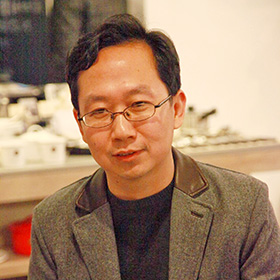 |
|
| |
Chen-chih Wang, Owner
Experiences
- PEKOE is a food zakka shop founded by Ms. Yeh, a travel writer and food critic. The shop sells selected imported and local ingredients and foods. In recent years, PEKOE focuses its main products on the local specialties of Taiwan, making it a must-visit place for foreign travelers.
- Mr. Wang is the owner of PEKOE Zakka Store, and Ms. Yeh’s husband. He graduated from the Department of Computer Science & Information Engineering, NTU, and has years of working experience in the IT industry. He later entered the food industry, and helped Ms. Yeh to realize her dream.
|
|
| |
|
|
| |
| Gourmet Masters |
(Shu-han) |
2) PEKOE Zakka Store
Time: March 11, 2014
Location: PEKOE Zakka Store
Introduction
The shop of PEKOE is near the school. Without much decoration, it is indeed popular among local customers and foreign visitors. Stores owned by celebrities are always scrutinized by the public. We are very curious about how this shop can survive in the alley of a busy commercial area, and be known for local specialties instead of imported products. We want to know how PEKOE selects its products, and if the agricultural products in Taiwan can be sold at a higher price. PEKOE also sells the jam of Red on Tree, so we want to know how consumers respond to Red on Tree jams.
Q1. PEKOE is a shop opened by gourmet, why didn’t you open a restaurant, but a zakka shop? (Wei-tse)
A1. Many readers of Ms. Yeh hope that she could share the foods she mentioned in the book with everyone, so I decided to open PEKOE upon the mission of sharing. At the very beginning, I launched a website, but many people hope to see the products in a physical store. So I decided to open PEKOE to share the good ingredients, and allow the customers to select and taste them carefully.
Q2. What is the target customers’ age of the store? Why do you name it “PEKOE”? Is there any special meaning? (Wei-tse)
A2. We want to share good foods to everyone, and hope that people of all ages can come and enjoy them. As long as everyone loves the foods in our store, we will be very happy. We named it Pekoe because it is an ancient English word, meaning the tip of tea trees, but now “pekoe” means the grading of black tea. I selected this name to express our devotion to the ingredients.
Q3. What is the business concept and characteristic of PEKOE? It is said that many travel books in Hong Kong recommend your store, so why do you think your store can attract foreign tourists? (Wei-tse)
A3. Our business concept is: delicious, natural, traditional, artificial and small-scale farming. We follow those principles when selecting our products. We have never advertised with publishers, and indeed we grow by word of mouth. The travel book recommends us because a Hong Kong journalist came to our store accidently, and brought our products back to Hong Kong to share with other journalists. Now, whenever they do a report on ingredients, they would think of us first. When your products are recognized, you will not feel lonely! Another key point is that our ingredients have Taiwan characteristics. When foreign tourists come to Taiwan, they want to buy gifts with local characteristics. Our products always present the characteristics of Taiwan, and this is very attractive to the foreign tourists!
| |
|
|
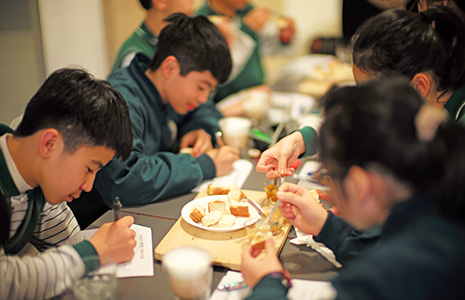 |
|
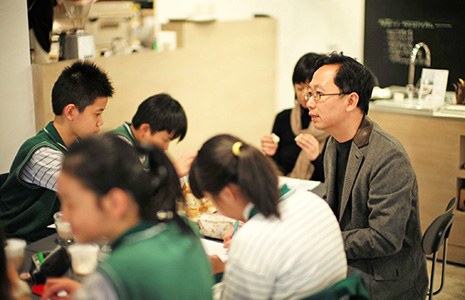 |
| |
|
Telling startup story |
| |
|
|
Q4. There are many products sold in the store, how do you select the products? Do you follow a standard selection procedure? (Tsung-chun)
A4. As I mentioned earlier our principles are delicious, natural, traditional, artificial and small-scale farming. We have reached a certain scale, and carry a wide variety of products. Some of them are produced by small farms, some are imported abroad, and some are developed by us, so there are different standards for product selection. For example, when farmers or producers in Taiwan contact us about selling their produces, we would learn about their story, the type of business, whether the ingredients are natural, whether environmentally friendly, and whether made with the ingredients we expected. We prefer products made with the traditional method. Then we taste the products and discuss. Ms. Yeh has the final say in the tasting with a high standard. If PEKOE develops its own products, the process is even more complicated. We need to find appropriate ingredients and processing producers, and make sure that they follow our standard. The taste will be adjusted several times before introduced to our store. The disadvantage of building our own brand is that it will take a long time, and the advantage is that it can completely follow our opinion and taste. It can truly represent PEKOE.
Q5. How is the acceptance level of local customers on those high-quality ingredients with relatively high unit price? (Tsung-chun)
A5. Although PEKOE is a niche shop, we cannot stay in business for 12 years without the support of local customers. Our products are expensive, but 100% natural. For example, a bottle of jam that contains 10% fruit is priced 100 NTD, and a bottle of jam that contains 100% fruit is priced 300 NTD, which one is more expensive? This is a very interesting question. The answer depends on which type of consumer you are. If you are satisfied with adulterated food, you will find the 300 NTD jam expensive. However, if you think about it carefully, the 300 NTD jam is not expensive at all. Although our products are more expensive, our profit is very low. That is why we do not have counters in department stores or duty-free shops.
Q6. What is the hardship and happiness in managing PEKOE to you? Could you share those moments with us? (Tsung-chun)
A6. PEKOE was established online in 2002. Our customers are food lovers. At the beginning, only few people would buy, and some thought that our products are overpriced. This is because we use 100% natural ingredients, and there is high cost and low profit of natural food. This is our hardship. In recent years, Taiwanese are paying more attention to “good” food. Especially after the food safety problem breaks out, more customers are supporting our products. Fortunately, more and more people accept us which makes us happy.
Q7. You have introduced many foreign products into Taiwan, so do you intend to promote good Taiwanese food to foreign markets? (Yin-cheng)
A7. Yes. We are now trying our best but with limited ability and budget. As our products are full of Taiwanese characteristics, they are sold in Japan, Hong Kong, and China. The significance of overseas selling is to show good Taiwanese ingredients in order to promote them outside of Taiwan.
| |
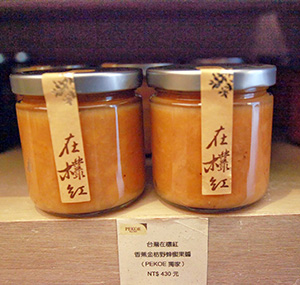 |
| |
Unique taste made by Red on Tree for PEKOE |
| |
|
Q8. What is the proportion of local products to imported products in your store? How do you encourage and support local products? (Yin-cheng)
A8. Taiwanese local products account for 60%~70% in our store. We always encourage and support local products and hope to sell more Taiwan products. However, Taiwanese farmers are not good at packaging, pricing and marketing. Thus, we assist them to make packaging and pricing, and instruct them how to sell products via various channels. In other words, what we do is to establish a bridge between producers and consumers. We seek for representative produces, and design suitable packaging in our store. Our packaging is not only environmentally friendly and convenient to consumers, but also tells the story of the products. In this way, the local products can easily attract people’s attention and gain more support.
Q9. Why did PEKOE select Red on Tree rather than other local brands as your products? What features of this brand are attractive to you? (Jie-sheng)
A9. We have cooperated with Red on Tree for a long time! At the beginning, Red on Tree was one of few natural jam producers in Taiwan. At that time, most of jam in the market contained many artificial additives. Red on Tree uses in-season fruits to make jam, which is different from common jam that sell all year round. The staffs of Red on Tree are willing to learn new knowledge. They know that jam making is difficult, and they even travelled to France to learn from famous French jam company. The fruits they select and the jam they make meet our standard, so we choose to cooperate with Red on Tree.
Q10. Knowing your customers, what are their motives when purchasing Red on Tree products? (Jie-sheng)
A10. Our consumers trust us, and we try our best to introduce the story of food, such as where the source is, and how the food is made, etc. The reason that they purchase Red on Tree products is to enjoy good quality fruits in Taiwan. Red on Tree jam also delivers a familiar flavor because it uses common fruits, which attract the customers easily.
Q11. PEKOE also sells jam imported from France, so what are the characteristics of French jam? What is the difference from Taiwanese jam? (Jie-sheng)
A11. The characteristic of French jam is that the jam is made to assimilate dessert. French jam usually combines two or three types of fruits and has high fruit content. In order to keep the full flavor of fruits, the making process is different. The cooking of jam is done in several stages in order to naturally release colloid, thus the taste and flavor is different. The main difference of Taiwanese jam is the “fruit”. The fruits produced in France and Taiwan are different. Blueberry, black currant, red currant, and European pear are common in France, while tropical fruits such as mango and litchi are common in Taiwan, thus the jam they made has different flavors.
Q12. What do you recommend for the use of jam? Are there any other ways besides spreading it on bread? (Jie-sheng)
A12. You can add the jam into black tea, yogurt, or cheese; or even use it in cooking, such as mixing fresh lettuce with jam to create a special salad. Those are all convenient ways to enjoy the jam.
| |
|
|
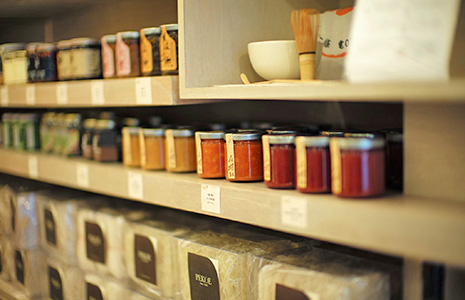 |
|
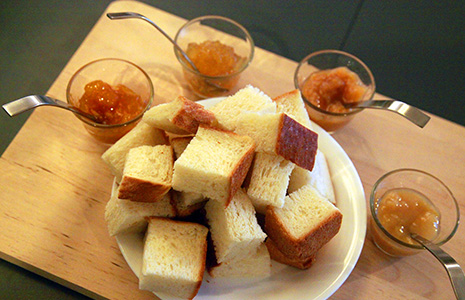 |
Rows of Red on Tree jams and local products sold in PEKOE |
|
|
| |
|
|
Conclusion
PEKOE shares the same concept with Red on Tree. Both are established by people who love local food and are brave in doing pioneering work. However, even though the founders have certain popularity, attentive operation is still essential. At the beginning, only a few people accepted the products, and the operation was difficult. The products are relatively expensive due to the 100% natural ingredients, but the profits are indeed low. As the food safety problems break out in recent years, people start to think carefully about whether a higher cost in health for the low-price products. Fortunately, more and more people support PEKOE. Both PEKOE and Red on Tree hope to make good use of local produces, and let the honest producers be the pride of Taiwan. |











